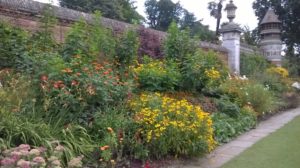February 2016 brought an invitation to return to an old favourite topic: houses and gardens with modern political associations. Discussions with a potential publisher updated the list of properties to be considered. Hughenden, Cliveden, The Wharf, Garsington, Trent Park and Port Lympne; Chartwell, Wallington, Sissinghurst, Birch Grove House, The Manor House, Hell Corner Farm, and Thenford were added to three properties from past lectures: The Wharf, Buscot and Ditchley.
Researching the Astors at Cliveden for a sample chapter brought a reconnection with the work of campaigners for equal compensation and pay. By the late 1930s Nancy Astor’s parliamentary reputation was in decline but some of her war time interventions were beneficial to the lobbying for women’s equality. She was also vocal in her support for women to be more involved in plans for post-war reconstruction.

Cliveden forecourt border, August 2017.The planting is inspired by Norah Lindsay’s schemes for Nancy Astor in the 1920s and early 1930s. Few overt reminders of Nancy Astor survive in the gardens; the pair of gates into a former walled garden (the present location of the information centre) commemorating her eightieth birthday in 1959 a rare exception.
Cliveden was Nancy’s stage too. The papers of Waldorf and Nancy Astor in the excellent Museum of English Rural Life archive (MERL), University of Reading, reveal that during the war, campaigning women MPs as politically various as Mavis Tate (appointed chair of the Women’s Power Committee in 1941, and of the Equal Pay Campaign in 1942); Irene Ward (Chair, Committee on Woman Power, 1940) and Ellen Wilkinson were guests on separate occasions. Margaret Wintringham, Liberal politician and the second woman to take her seat in Parliament was a frequent guest long after she had lost her seat in the 1924 General Election. Nancy Astor’s steadfastness in the hostile, all-male parliament, emboldened Wintringham to stick it out at Westminster (as she gratefully acknowledged) but the key to their long-lasting friendship may have stemmed from shared Christian Science beliefs. The social and political mix of guests at Cliveden weekends was usually eclectic; an invitation brought opportunities to relax and recharge, but also network. Invitations extended beyond establishment figures to weary social workers and civil servants.
As MP for the heavily-bombed constituency of Plymouth Sutton (and regularly deputizing for her husband as Lord Mayor) much of Nancy Astor’s attention during the war years was, of necessity, focused on Plymouth. The constant travelling between the two cities, not to mention nationwide speaking engagements, was exhausting. Little time was left for reflection – a quality already largely missing from Nancy Astor’s personality.
The Astor archives at MERL far exceeded my expectations as a resource. The estate papers are particularly good and form the basis of my reassessment of the roles played by Cliveden in the era of Nancy and Waldorf Astor.
Honor Balfour fleetingly appears in both the LSE’s WPPA archive and MERL’s Astor papers, as a participant in the Brains Trust event organized by Women for Westminster in December 1944, and a guest at Cliveden in November 1949. The latter presumably as an upcoming commentator on Anglo-American relations, and freelancer on the David Astor-edited Observer newspaper. Seeing her name in the Visitor’s Book reminded me of our many conversations at her home in Windrush, and led me to regret we never discussed her impressions of Cliveden. An astute commentator on contemporary politics right to the end of her life her insights are much missed.
